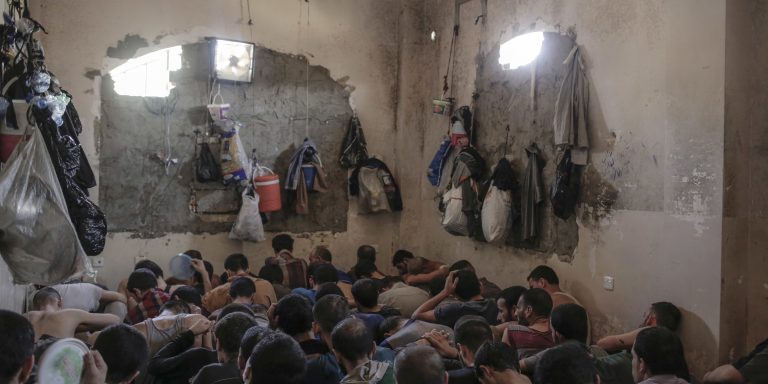INTELBRIEF
February 15, 2018
TSC IntelBrief: Foreign Fighters on Trial

- The United States is urging other countries to repatriate captured foreign fighters so they may face trial.
- The U.S. request is complicated by America’s continued use of the extra-legal Guantanamo Bay detention camp.
- U.S.-supported Syrian Democratic Forces (SDF) are holding several hundred foreign fighters, as many countries simply do not want those captives returned.
- Trying a foreign fighter in their home country for crimes committed elsewhere is legally challenging; however, the alternative—indefinite detention by an entity like the SDF—is even more problematic.
Countries face a range of challenges when addressing the ‘foreign fighters’ phenomenon: countering the ideology that drew their citizens to Iraq and Syria in the first place; properly assessing the threat of those who have returned; and deciding whether to bring back foreign fighters captured and held in Iraq and Syria to stand trial in civilian courts. The particular issue of repatriating foreign fighters for trial is legally complicated and politically explosive. No government is eager to repatriate fighters who may be exonerated in a court of law, given the difficulties in trying someone for alleged crimes committed in a war zone on behalf of a semi-clandestine organization.
The United States is now urging countries to facilitate the return home of captured foreign fighters, with the issue of the two remaining British fighters known as ‘the Beatles’ being the most high-profile given their notoriety. El Shafee Elsheikh and Alexanda Amon Kotey were captured by the U.S.-supported Syrian Democratic Forces (SDF) in early January. These two men, along with two others since killed by coalition forces, were members of a particularly violent group that stood out even in an organization known for celebrating savagery. The British government has said it does not want the men returned to the UK and prefers for them to stand trial in the country where they committed their crimes.
The U.S. position on the return of foreign fighters is undercut by the existence of the extra-legal Guantanamo Bay detention camp (GTMO). An argument for the continued use of GTMO is that there are some terror suspects simply too dangerous to allow back into the civilian court system. While this argument ignores the fact that the civilian court system is superior in prosecuting terrorism cases, U.S. allies will likely remain skeptical. The U.S. says the issue is simply one of logistics and security: the SDF is not a nation-state, its detention facilities are at capacity, and they are not designed to serve as permanent prisons. For the U.S., the status quo is unsustainable.
The high-profile case of the two remaining ‘Beatles’ is just one of the hundreds of potential cases, given how many people traveled to join the so-called Islamic State from many countries. Figures are widely available on the numbers of foreign fighters believed to have left for Iraq and Syria – far less is known on how many foreign fighters are currently in captivity. Countries like France, the UK, Tunisia, Germany, Belgium, Saudi Arabia, and many more, had hundreds of their citizens travel to join the Islamic State. It is reasonable to assume that more than a handful of citizens from these countries have likely been captured and remain in some form of detention in Iraq or Syria.
Their fate remains uncertain. For those captured in Iraq, speedy mass trials raise questions of due process, as does the difficulty in obtaining evidence beyond a confession for alleged crimes committed in Raqqa or Mosul. Additionally, in Syria, the matter is further complicated by the ongoing civil war and the question of to whom the SDF would hand over detainees. Were these fighters to be brought back to their respective countries, the most clear-cut charge could be membership in a terrorist group, or some version the U.S. material support for terrorism charge. The issue of foreign fighters has not collapsed in parallel with the group they traveled to support and countries will be dealing with this challenge for years to come.
For tailored research and analysis, please contact: info@thesoufancenter.org
[video width="960" height="540" mp4="https://thesoufancenter.org/wp-content/uploads/2018/02/Final-Edit-1-132.mp4" poster="https://thesoufancenter.org/wp-content/uploads/2018/02/AP_17200451232995.jpg"][/video]